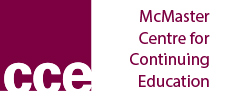
Opportunity
McMaster University is located in Hamilton, a city of 500,000 in southern Ontario, Canada, which has over time experienced significant losses in employment due to declines in its industrial, steel and manufacturing industries. In 2010, a newspaper series reported that 17% of the population lived below the poverty level and that the health disparities between people in different regions of the city were dramatic. At about the same time, McMaster President Patrick Deanne sent an open letter called Forward with Integrity to members of the university community, encouraging them to find new and innovative ways to approach their academic and research activities. McMaster’s relationship with its surrounding community was highlighted as one of four key themes to guide faculty and staff plans and actions.

Since Dr. Deane’s letter, McMaster’s Centre for Continuing Education incorporated community engagement as a key pillar in its strategic plan. Working with others in the Hamilton area, including the Hamilton Community Foundation and faculty in McMaster’s School of Social Work, the Centre championed the idea of a certificate program in community engagement for those working in school boards, libraries, city government, grassroots organizations, and neighbourhood development settings. Working together, this team co-created a five-course academic certificate program that uses a blended learning model.
Innovation
The Leadership in Community Engagement program is designed for working professionals, incorporating experiential learning and intercultural curricular practices in all aspects of the program. Further, program content, the learning environment and the pedagogies used in the program foster inclusiveness and critical reflection on community and diversity.
Dr. Lorraine Carter, Director of the Centre for Continuing Education, says blended learning is used for program delivery as it responds best to the needs of the learners. One course, Foundational Principles and Practices in Community Engagement, is offered entirely face-to-face so that participants develop networks and connections. The four subsequent courses offer an approximate 50-50 mix of online and face-to-face, stressing experiential learning. These courses are:
- Communication and Conflict in Communities: Ethical Approaches in Supporting Group Process and Decision Making;
- Facilitation Collaborative Leadership and Grassroots Governance in Communities;
- A Primer on Evaluation, Community-based Research and Persuasive Asks: Data-Driven Community Work; and
- Practising Engagement: A Reflective Project Course.
Online communication and discussion of issues in community engagement are central to each course and enable exchange of experiences and perspectives. Learners also share resources and links, supporting development of their online communication skills.
Benefits and Outcomes
The learners in this program often implement the projects designed in the Reflective Project course. A group of students from Dunnville, Ontario, a small rural community outside of Hamilton, has been particularly active in converting their learning to action. This outcome underscores not only the inspirational nature of the program but also the flexibility of its content and approaches. Although designed for an urban setting, the courses are clearly benefitting those outside the original target audience.
Employers of learners involved in the program including the City of Hamilton and the Hamilton-Wentworth School Board have reported that their staff are more thoughtful and more aware of community options and possibilities.
Speakers are brought into the program and to share multiple approaches to the practice of community engagement. As an example, presenters from the John Howard Society have been appreciated for sharing their knowledge of and experience in issues such as conflict resolution.
On an ongoing basis, learners share their suggestions and responses through course evaluations and other feedback sessions. The Canadian Association of University Continuing Education has also funded research based on the program. Findings will be used to enhance and improve the program.
The first graduates of the program will be recognized in fall 2018.
Challenges and Enhancements
Funding programs in Continuing Education is an ongoing challenge, with a need to balance programs offered as part of commitment to community with those that are part of base funding and in high demand, such as Human Resources and Business.
The Leadership in Community Engagement program is centered on community practitioners and their experiences. While theoretical constructs have a place in the program, experience and difficult issues are of utmost importance. Such content can challenge traditional thinking about topics such as oppression, diversity and access, and it is, therefore, very important to be clear about the focus and values underpinning the program with prospective learners.
Potential
Dr. Carter recognizes that Hamilton is not the only community in which those involved in and aspiring to community engagement could benefit from access to this program. Given this, a fully online program that could be shared across the country is under consideration.
For Further Information
Dr. Lorraine Carter
Director
Centre for Continuing Education
McMaster University
Hamilton, Ontario
[email protected]


